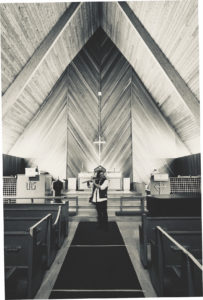
“I moved here in the summer of 2019,” says Eric Maul, a Provincetown-based, classically trained flutist. “I’d been living in Boston for five years, and I just wasn’t getting what I wanted.”
He has been doing a weekly live-stream, called Flutin’ ’n’ Tootin’, Sundays at 1 p.m. via his Facebook page, from the auditorium of the United Methodist Church on Shank Painter Road.
“I come from a conservative area in Maryland,” says Maul. “I say I’m from Baltimore, but I’m really from Annapolis. It’s a very big military town.” In fourth grade, his mother encouraged him to join the school band. She wanted him to play the French horn, but Maul had other plans.
“At the time, I didn’t realize it, but it was my earliest way to fuck with gender norms,” he says. “I loved flute players — I thought they were so elegant. And the sound as well. This is as close to being a diva soprano as I will ever get.”
Maul went to the prestigious Peabody Institute of Johns Hopkins University in Baltimore as an undergraduate, where he studied with Marina Piccinini. Then he did his master’s at the New England Conservatory of Music in Boston, where he studied with Paula Robison.
It’s an impressive résumé, but he wasn’t coping well in his personal life. “Musicians are always very positive — ‘Everything’s fine! Everything’s fine!’ — but what I went through was highly traumatizing, and I didn’t realize it until later,” says Maul. “I was diagnosed with HIV three days before my master’s recital.”
Things began to spiral downward. The cutthroat nature of conservatory life didn’t help. “There always seemed to be this competition between everyone — who’s the busiest person in the room?” says Maul. “I ended up being like ‘Music’s making me miserable.’ ” He quit for a while.
“I started playing again at the end of 2017, because my grandmother passed away,” he says. Playing at her funeral was Maul’s first public performance in a long time. But then he stopped again.
Maul moved to Provincetown in order to re-evaluate his life. During the summer, he bartends and works at the Boatslip Resort.
When the pandemic first hit, local musician Jon Richardson encouraged him to do a live-stream. He worked on Telemann’s 12 Fantasias for Flute in a segment he called “The Morning Fantasy” — the title being, purposely, just a little dirty. Then he started Flutin’ ’n’ Tootin’.
Getting back into playing has given his life structure. At first, he said, “I’m just going to play a scale a day.” It is hard, hard work to practice when you don’t feel like it, Maul explains. But this time around, he has no doubt that it is his calling.
“Clearly, I was Pan in a past life,” he says, wryly, “and I just continue to be the god of debauchery and flute playing.”
Last summer, Maul performed as part of John Thomas’s series “Great Music on Sundays @5,” playing a sonata by Frederick the Great — yes, the Prussian king! — who was gay. It opens with a sicilienne, a traditionally feminine form.

“Classical music is the only art form that doesn’t really have a history in this town, which feels really bizarre to me,” says Maul. Though show tunes and piano bars are great, “I think there’s a need for real variety.”
Maul says one of the things he finds most difficult out here is “when people don’t understand what I do. I want to create a space for queer classical music.” He wants to bring out queer ensembles and commission queer composers.
Maul started the “Art of the Duo” project when he was in Boston. “Duets are not very well respected within classical music,” he says. He wants to bring it to Provincetown, and he’s planning collaborations with bassoonist Isaac Erb and violist Jason Amos of the Boston Public Quartet.
Classical music, in both its culture and history, is, in many ways, sexist and homophobic. It is full of old white men, and it has had its share of accusations by the #MeToo movement. When Maul started growing out his hair, he says, “If I became too flamboyant, I was very aware that that behavior was not acceptable.”
But classical music has to be reclaimed, and what better place to do it than Provincetown?
Meanwhile, Maul is still working on himself. “Most people take about five years to recover emotionally from the diagnosis,” says Maul. He says he is just getting there. “A month into living in P’town, I realized, ‘I feel funny.’ And someone said, ‘You’re probably comfortable for the first time in your whole life.’ ”
